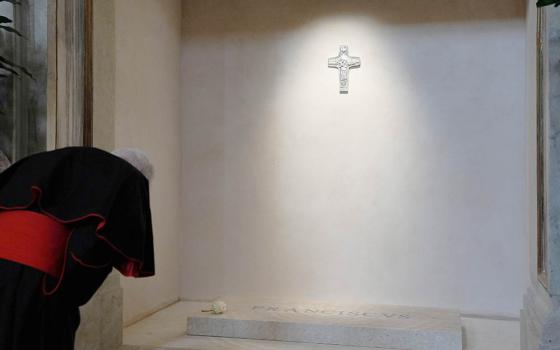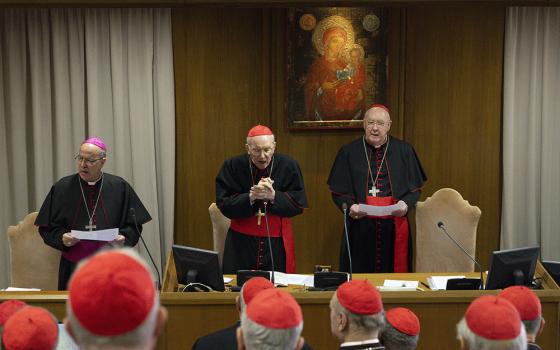
Congregation Jesu Sisters in Zimbabwe are better known as the Mary Ward Sisters, pictured during their 2018 regional assembly. From left to right, front row, are Srs. Josephine Nyikadzino, Gamuchirai Waduka and Sr. Aleta Dube; back row, left to right, are Srs. Anna Jinga, Bernadette Takaendesa, Florence Gandashanga and Greater Mpofu, and Sr. Jane Francisca Mulongo of the Institute of the Blessed Virgin Mary, then provincial of the Loreto Sisters of Eastern Africa Province. Mary Ward is the foundress of both congregations, which are reflecting on becoming one institute. (Provided photo)
Venerable Mary Ward (1585-1645) was convinced that "women in time to come will do much." These were the words of a woman who lived at a time when women were not seen to even have the ability to comprehend spirituality, let alone become leaders. She believed in the capacity of women, through education, to make a huge difference for the common good.
I got to know the Mary Ward Sisters (in Zimbabwe, the Congregatio Jesu sisters are better known as Mary Ward Sisters) through my uncle, who was a Jesuit. The way the sisters prayed together and helped marginalized people in society by empowering them through education — that really caught my eye. I was so excited at the thought of joining a community where I could be that close to people, and loved being a part of it.
Our first sisters came from Germany to Zimbabwe in 1951, and I am so grateful to those brave and courageous women who took risks to begin this beautiful mission in Zimbabwe. I acknowledge and respect the Mary Ward Sisters' education — past and present education — for their commitment and love for people and all creation. And I appreciate the benefactors who provided the financial and moral support needed to continue our mission in Zimbabwe. And I am delighted that we are starting a new mission in Mozambique!
Currently a lot of our focus is in working collaboratively with the government and with nongovernmental organizations, or NGOs, in caring for the environment, protecting children, combating human trafficking and providing education — recently education — in the fight against the COVID-19 pandemic. Mary Ward's rich legacy inspires us today to be "seekers of truth and doers of justice," in all our ministries.
In education ministry, we collaborate with others to bring the Gospel to life in the church and in society. Education is a vital part of this mission — a way of promoting full human formation, spiritual growth and freedom. Holistic education liberates, empowers and motivates students to use their individual gifts with confidence, creativity and generosity, in loving service. At St. Ignatius College, Chishawasha, we run a hostel for girls in forms 5 and 6. We empower these young women to be leaders within the society and church, by developing their professional skills.
We provide education for young people who are often deprived of the opportunity of an education. We also pay fees for poor children who otherwise would not be able to go to school, assisting them up to university level. A year ago, I was walking outside the gate of Mary Ward Primary School in Mbizo, Kwekwe, when some kids waved at me and shouted, "Mary Ward Super." I waved back and thanked them!
In our health ministries, we serve as nurses, midwives, hospital administrators, HIV/AIDS counselors and health educators; one sister is a national health coordinator for the Zimbabwe Catholic Bishops' Conference, or ZCBC. Some of our sisters are on the frontlines in the fight against the COVID-19 pandemic and other tropical diseases like malaria, typhoid and cholera. They are involved in outreach programs on HIV/AIDS and cervical cancer.
They go out to where the needy people are, providing health and environmental education, and nutritional feeding to undernourished children and adults. Our two clinics do not charge fees to people living in poverty. Our Waiting Mothers' Shelter provides the local pregnant women with medical care before labor starts. This helps reduce maternal deaths, as more women are now able to deliver at the clinic rather than at their rural homes. Once I asked a woman why she came to this clinic from 100 km (62 miles) away. She said, "It's the way the staff treats the patients; we feel respected here."
Advertisement
Social ministries include advocacy; empowerment of women; feeding poor children; work with migrants and displaced persons; outreach to the homeless and hungry, abused and abandoned children, vulnerable girls and women, and victims of trafficking; social justice; and care of creation and sustainability.
We run a residential center, Mary Ward Children's Home, for about 70 vulnerable children who have been abandoned, abused or orphaned. Our aim is to provide shelter, stability, security, healing and growth to children from infancy up to age 18. Some of them continue to receive care until they have finished tertiary education, college or university studies. We assist some in finding employment. The home provides these children with a balanced, happy yet challenging care that prepares them to exert a lasting influence in society.
I have beautiful memories of the 13 years I worked at the home. What a joy it was for me to welcome an abandoned day-old baby into our home, and bathe, clothe and feed her or him! In some cases, the babies had lost their voices from crying in the bush. I recall how we co-created ways of caring together with the children. It was indeed a time of grace, a way through which God was made known to me and the children.
Pastoral ministries include spiritual direction and accompaniment, working with men's and women's guilds, youth ministry, small children (Missionary Childhood) and giving recollection days before big feasts. We do parish work, including liturgy; organizing pilgrimages, days of prayer and prayer groups; sacramental preparation, and visiting the sick. Usually our sisters provide pastoral care as part of another ministry such as teaching, leadership, formation, social work or nursing. We have nine communities in three dioceses and we have been invited to others.
Our intellectual ministry includes all forms of theological and pastoral research and writing, often by our sisters specialized in these areas, and sisters working at colleges and universities. It involves lecturing, preaching by invitation, community building, conflict resolution, team leadership development and facilitation of groups — including chapters and assemblies. Some sisters are invited by other religious congregations to prepare young women for final vows. Personally, I have been so enriched and moved by accompanying a young sister from another congregation, preparing her for final commitment.
We now have sisters trained in social communication who work in schools, teaching English and communication and working part-time in the media — contributing and evangelizing through our newsletter, website and Facebook page. I think social communication is extremely important today, especially in working with young people.
Since 2012, our "open circle" has included laypeople — men and women — in forming a Mary Ward family. The Mary Ward Friends Association provides an opportunity for laypeople to come together to explore the spirituality of Mary Ward, apply it to their lives, and make her legacy better known.
We are in touch with the reality in our world. During these days of the COVID-19 pandemic, we share our care and solidarity with the whole world in many different ways: prayer, health education and care, production of masks and distribution of protective equipment. In Zimbabwe, lockdown has exposed poverty among the majority of people, which is causing anxiety and despair. We send messages of encouragement and hope and offer counseling services to individuals and families.
Black Lives Matter has opened us to a deeper human connection and quest for justice. Our hearts were broken and our faces drowned in tears as we watched the killing of George Floyd. His cry calls attention to all people in the world who are suffocating and calling out, "I can't breathe."
This challenges us to question how we relate to one another and the whole of creation. Are we open to other faiths, other cultures, other nationalities? We continue to search for ways which can make our world a better home for everybody by seeking God in all things and reflecting on ways which can bring hope, justice, peace and healing for all.
I no longer see us only as women for others, but also women with others. I no longer think of our work as only service, but as an act of solidarity, of becoming one with our brothers and sisters and with all creation. This is my greatest joy as a Mary Ward Sister!
[Mercy Shumbamhini belongs to the Congregation of Jesus. Presently, she serves as mission developmental facilitator of her congregation in Zimbabwe, sits on a number of boards, and lectures at the university level on social work, Ignatian spirituality and theology.]







